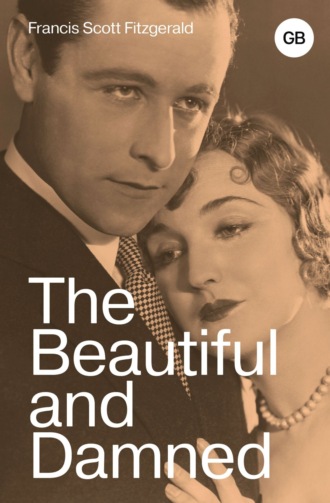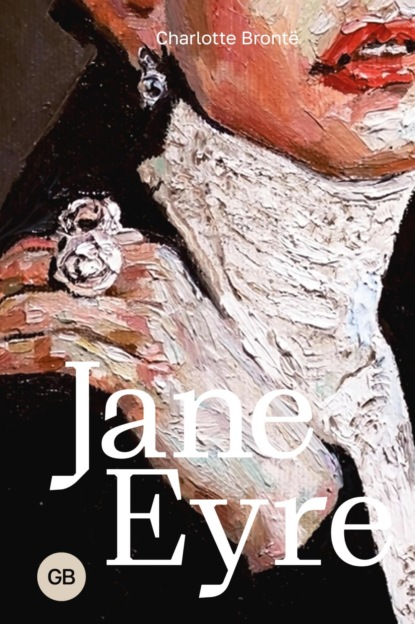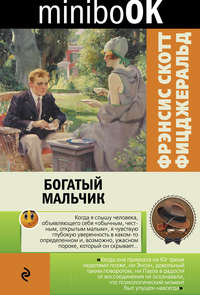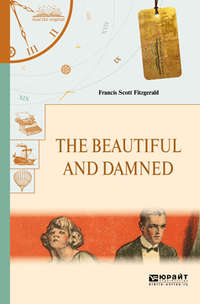
Полная версия
The Beautiful and Damned / Прекрасные и обреченные
She knew there had been a string of affairs spread over about three years, perhaps a dozen of them altogether. Sometimes the men were undergraduates, sometimes just out of college-they lasted on an average of several months each, with short attractions in between. Once or twice they had endured longer and her mother had hoped she would be engaged, but always a new one came-a new one-
The men? Oh, she made them miserable, literally! There was only one who had kept any sort of dignity, and he had been a mere child, young Carter Kirby, of Kansas City, who was so conceited anyway that he just sailed out on his vanity one afternoon and left for Europe next day with his father. The others had been-wretched. They never seemed to know when she was tired of them, and Gloria had seldom been deliberately unkind. They would keep phoning, writing letters to her, trying to see her, making long trips after her around the country. Some of them had confided in Mrs. Gilbert, told her with tears in their eyes that they would never get over Gloria… at least two of them had since married, though… But Gloria, it seemed, struck to kill-to this day Mr. Carstairs called up once a week, and sent her flowers which she no longer bothered to refuse.
Several times, twice, at least, Mrs. Gilbert knew it had gone as far as a private engagement-with Tudor Baird and that Holcome boy at Pasadena. She was sure it had, because-this must go no further-she had come in unexpectedly and found Gloria acting, well, very much engaged indeed. She had not spoken to her daughter, of course. She had had a certain sense of delicacy and, besides, each time she had expected an announcement in a few weeks. But the announcement never came; instead, a new man came.
Scenes! Young men walking up and down the library like caged tigers! Young men glaring at each other in the hall as one came and the other left! Young men calling up on the telephone and being hung up upon in desperation! Young men threatening South America!.. Young men writing the most pathetic letters! (She said nothing to this effect, but Dick fancied that Mrs. Gilbert's eyes had seen some of these letters.)
… And Gloria, between tears and laughter, sorry, glad, out of love and in love, miserable, nervous, cool, amidst a great returning of presents, substitution of pictures in immemorial frames, and taking of hot baths and beginning again-with the next.
That state of things continued, assumed an air of permanency. Nothing harmed Gloria or changed her or moved her. And then out of a clear sky one day she informed her mother that undergraduates wearied her. She was absolutely going to no more college dances.
This had begun the change-not so much in her actual habits, for she danced, and had as many “dates” as ever-but they were dates in a different spirit. Previously it had been a sort of pride, a matter of her own vainglory. She had been, probably, the most celebrated and sought-after young beauty in the country. Gloria Gilbert of Kansas City! She had fed on it ruthlessly-enjoying the crowds around her, the manner in which the most desirable men singled her out; enjoying the fierce jealousy of other girls; enjoying the fabulous, not to say scandalous, and, her mother was glad to say, entirely unfounded rumors about her-for instance, that she had gone in the Yale swimming-pool one night in a chiffon evening dress.
And from loving it with a vanity that was almost masculine-it had been in the nature of a triumphant and dazzling career-she became suddenly anaesthetic to it. She retired. She who had dominated countless parties, who had blown fragrantly through many ballrooms to the tender tribute of many eyes, seemed to care no longer. He who fell in love with her now was dismissed utterly, almost angrily. She went listlessly with the most indifferent men. She continually broke engagements, not as in the past from a cool assurance that she was irreproachable, that the man she insulted would return like a domestic animal-but indifferently, without contempt or pride. She rarely stormed at men any more-she yawned at them. She seemed-and it was so strange-she seemed to her mother to be growing cold.
Richard Caramel listened. At first he had remained standing, but as his aunt's discourse waxed in content-it stands here pruned by half, of all side references to the youth of Gloria's soul and to Mrs. Gilbert's own mental distresses-he drew a chair up and attended rigorously as she floated, between tears and plaintive helplessness, down the long story of Gloria's life. When she came to the tale of this last year, a tale of the ends of cigarettes left all over New York in little trays marked “Midnight Frolic” and “Justine Johnson's Little Club,” he began nodding his head slowly, then faster and faster, until, as she finished on a staccato note, it was bobbing briskly up and down, absurdly like a doll's wired head, expressing-almost anything.
In a sense Gloria's past was an old story to him. He had followed it with the eyes of a journalist, for he was going to write a book about her some day. But his interests, just at present, were family interests. He wanted to know, in particular, who was this Joseph Bloeckman that he had seen her with several times; and those two girls she was with constantly, “this” Rachael Jerryl and “this” Miss Kane-surely Miss Kane wasn't exactly the sort one would associate with Gloria!
But the moment had passed. Mrs. Gilbert having climbed the hill of exposition was about to glide swiftly down the ski-jump of collapse. Her eyes were like a blue sky seen through two round, red window-casements. The flesh about her mouth was trembling.
And at the moment the door opened, admitting into the room Gloria and the two young ladies lately mentioned.
Two Young Women“Well!”
“How do you do, Mrs. Gilbert!”
Miss Kane and Miss Jerryl are presented to Mr. Richard Caramel. “This is Dick” (laughter).
“I've heard so much about you,” says Miss Kane between a giggle and a shout.
“How do you do,” says Miss Jerryl shyly.
Richard Caramel tries to move about as if his figure were better. He is torn between his innate cordiality and the fact that he considers these girls rather common-not at all the Farmover type.
Gloria has disappeared into the bedroom.
“Do sit down,” beams Mrs. Gilbert, who is by now quite herself. “Take off your things.” Dick is afraid she will make some remark about the age of his soul, but he forgets his qualms in completing a conscientious, novelist's examination of the two young women.
Muriel Kane had originated in a rising family of East Orange. She was short rather than small, and hovered audaciously between plumpness and width. Her hair was black and elaborately arranged. This, in conjunction with her handsome, rather bovine eyes, and her over-red lips, combined to make her resemble Theda Bara, the prominent motion picture actress. People told her constantly that she was a “vampire,” and she believed them. She suspected hopefully that they were afraid of her, and she did her utmost under all circumstances to give the impression of danger. An imaginative man could see the red flag that she constantly carried, waving it wildly, beseechingly-and, alas, to little spectacular avail. She was also tremendously timely: she knew the latest songs, all the latest songs-when one of them was played on the phonograph she would rise to her feet and rock her shoulders back and forth and snap her fingers, and if there was no music she would accompany herself by humming.
Her conversation was also timely: “I don't care,” she would say, “I should worry and lose my figure”-and again: “I can't make my feet behave when I hear that tune. Oh, baby!”
Her finger-nails were too long and ornate, polished to a pink and unnatural fever. Her clothes were too tight, too stylish, too vivid, her eyes too roguish, her smile too coy. She was almost pitifully overemphasized from head to foot.
The other girl was obviously a more subtle personality. She was an exquisitely dressed Jewess with dark hair and a lovely milky pallor. She seemed shy and vague, and these two qualities accentuated a rather delicate charm that floated about her. Her family were “Episcopalians,” owned three smart women's shops along Fifth Avenue, and lived in a magnificent apartment on Riverside Drive. It seemed to Dick, after a few moments, that she was attempting to imitate Gloria-he wondered that people invariably chose inimitable people to imitate.
“We had the most hectic time!” Muriel was exclaiming enthusiastically. “There was a crazy woman behind us on the bus. She was absitively, posolutely nutty! She kept talking to herself about something she'd like to do to somebody or something. I was petrified, but Gloria simply wouldn't get off.”
Mrs. Gilbert opened her mouth, properly awed.
“Really?”
“Oh, she was crazy. But we should worry, she didn't hurt us. Ugly! Gracious! The man across from us said her face ought to be on a night-nurse in a home for the blind, and we all howled, naturally, so the man tried to pick us up.”
Presently Gloria emerged from her bedroom and in unison every eye turned on her. The two girls receded into a shadowy background, unperceived, unmissed.
“We've been talking about you,” said Dick quickly, “-your mother and I.”
“Well,” said Gloria.
A pause-Muriel turned to Dick.
“You're a great writer, aren't you?”
“I'm a writer,” he confessed sheepishly.
“I always say,” said Muriel earnestly, “that if I ever had time to write down all my experiences it'd make a wonderful book.”
Rachael giggled sympathetically; Richard Caramel's bow was almost stately. Muriel continued:
“But I don't see how you can sit down and do it. And poetry! Lordy, I can't make two lines rhyme. Well, I should worry!”
Richard Caramel with difficulty restrained a shout of laughter. Gloria was chewing an amazing gum-drop and staring moodily out the window. Mrs. Gilbert cleared her throat and beamed.
“But you see,” she said in a sort of universal exposition, “you're not an ancient soul-like Richard.”
The Ancient Soul breathed a gasp of relief-it was out at last.
Then as if she had been considering it for five minutes, Gloria made a sudden announcement:
“I'm going to give a party.”
“Oh, can I come?” cried Muriel with facetious daring.
“A dinner. Seven people: Muriel and Rachael and I, and you, Dick, and Anthony, and that man named Noble-I liked him-and Bloeckman.”
Muriel and Rachael went into soft and purring ecstasies of enthusiasm. Mrs. Gilbert blinked and beamed. With an air of casualness Dick broke in with a question:
“Who is this fellow Bloeckman, Gloria?”
Scenting a faint hostility, Gloria turned to him.
“Joseph Bloeckman? He's the moving picture man. Vice-president of 'Films Par Excellence.' He and father do a lot of business.”
“Oh!”
“Well, will you all come?”
They would all come. A date was arranged within the week. Dick rose, adjusted hat, coat, and muffler, and gave out a general smile.
“By-by,” said Muriel, waving her hand gaily, “call me up some time.”
Richard Caramel blushed for her.
Deplorable End Of The Chevalier O'KeefeIt was Monday and Anthony took Geraldine Burke to luncheon at the Beaux Arts-afterward they went up to his apartment and he wheeled out the little rolling-table that held his supply of liquor, selecting vermouth, gin, and absinthe for a proper stimulant.
Geraldine Burke, usher at Keith's, had been an amusement of several months. She demanded so little that he liked her, for since a lamentable affair with a débutante the preceding summer, when he had discovered that after half a dozen kisses a proposal was expected, he had been wary of girls of his own class. It was only too easy to turn a critical eye on their imperfections: some physical harshness or a general lack of personal delicacy-but a girl who was usher at Keith's was approached with a different attitude. One could tolerate qualities in an intimate valet that would be unforgivable in a mere acquaintance on one's social level.
Geraldine, curled up at the foot of the lounge, considered him with narrow slanting eyes.
“You drink all the time, don't you?” she said suddenly.
“Why, I suppose so,” replied Anthony in some surprise. “Don't you?”
“Nope. I go on parties sometimes-you know, about once a week, but I only take two or three drinks. You and your friends keep on drinking all the time. I should think you'd ruin your health.”
Anthony was somewhat touched.
“Why, aren't you sweet to worry about me!”
“Well, I do.”
“I don't drink so very much,” he declared. “Last month I didn't touch a drop for three weeks. And I only get really tight about once a week.”
“But you have something to drink every day and you're only twenty-five. Haven't you any ambition? Think what you'll be at forty?”
“I sincerely trust that I won't live that long.”
She clicked her tongue with her teeth.
“You cra-azy!” she said as he mixed another cocktail-and then: “Are you any relation to Adam Patch?”
“Yes, he's my grandfather.”
“Really?” She was obviously thrilled.
“Absolutely.”
“That's funny. My daddy used to work for him.”
“He's a queer old man.”
“Is he nice?” she demanded.
“Well, in private life he's seldom unnecessarily disagreeable.”
“Tell us about him.”
“Why,” Anthony considered “-he's all shrunken up and he's got the remains of some gray hair that always looks as though the wind were in it. He's very moral.”
“He's done a lot of good,” said Geraldine with intense gravity.
“Rot!” scoffed Anthony. “He's a pious ass-a chickenbrain.”
Her mind left the subject and flitted on.
“Why don't you live with him?”
“Why don't I board in a Methodist parsonage?”
“You cra-azy!”
Again she made a little clicking sound to express disapproval. Anthony thought how moral was this little waif at heart-how completely moral she would still be after the inevitable wave came that would wash her off the sands of respectability.
“Do you hate him?”
“I wonder. I never liked him. You never like people who do things for you.”
“Does he hate you?”
“My dear Geraldine,” protested Anthony, frowning humorously, “do have another cocktail. I annoy him. If I smoke a cigarette he comes into the room sniffing. He's a prig, a bore, and something of a hypocrite. I probably wouldn't be telling you this if I hadn't had a few drinks, but I don't suppose it matters.”
Geraldine was persistently interested. She held her glass, untasted, between finger and thumb and regarded him with eyes in which there was a touch of awe.
“How do you mean a hypocrite?”
“Well,” said Anthony impatiently, “maybe he's not. But he doesn't like the things that I like, and so, as far as I'm concerned, he's uninteresting.”
“Hm.” Her curiosity seemed, at length, satisfied. She sank back into the sofa and sipped her cocktail.
“You're a funny one,” she commented thoughtfully. “Does everybody want to marry you because your grandfather is rich?”
“They don't-but I shouldn't blame them if they did. Still, you see, I never intend to marry.”
She scorned this.
“You'll fall in love someday. Oh, you will-I know.” She nodded wisely.
“It'd be idiotic to be overconfident. That's what ruined the Chevalier O'Keefe.”
“Who was he?”
“A creature of my splendid mind. He's my one creation, the Chevalier.”
“Cra-a-azy!” she murmured pleasantly, using the clumsy rope ladder with which she bridged all gaps and climbed after her mental superiors. Subconsciously she felt that it eliminated distances and brought the person whose imagination had eluded her back within range.
“Oh, no!” objected Anthony, “oh, no, Geraldine. You mustn't play the alienist upon the Chevalier. If you feel yourself unable to understand him I won't bring him in. Besides, I should feel a certain uneasiness because of his regrettable reputation.”
“I guess I can understand anything that's got any sense to it,” answered Geraldine a bit testily.
“In that case there are various episodes in the life of the Chevalier which might prove diverting.”
“Well?”
“It was his untimely end that caused me to think of him and made him apropos in the conversation. I hate to introduce him end foremost, but it seems inevitable that the Chevalier must back into your life.”
“Well, what about him? Did he die?”
“He did! In this manner. He was an Irishman, Geraldine, a semi-fictional Irishman-the wild sort with a genteel brogue and 'reddish hair.' He was exiled from Erin in the late days of chivalry and, of course, crossed over to France. Now the Chevalier O'Keefe, Geraldine, had, like me, one weakness. He was enormously susceptible to all sorts and conditions of women. Besides being a sentimentalist he was a romantic, a vain fellow, a man of wild passions, a little blind in one eye and almost stone-blind in the other. Now a male roaming the world in this condition is as helpless as a lion without teeth, and in consequence the Chevalier was made utterly miserable for twenty years by a series of women who hated him, used him, bored him, aggravated him, sickened him, spent his money, made a fool of him-in brief, as the world has it, loved him.
“This was bad, Geraldine, and as the Chevalier, save for this one weakness, this exceeding susceptibility, was a man of penetration, he decided that he would rescue himself once and for all from these drains upon him. With this purpose he went to a very famous monastery in Champagne called-well, anachronistically known as St. Voltaire's. It was the rule at St. Voltaire's that no monk could descend to the ground story of the monastery so long as he lived, but should exist engaged in prayer and contemplation in one of the four towers, which were called after the four commandments of the monastery rule: Poverty, Chastity, Obedience, and Silence.
“When the day came that was to witness the Chevalier's farewell to the world he was utterly happy. He gave all his Greek books to his landlady, and his sword he sent in a golden sheath to the King of France, and all his mementos of Ireland he gave to the young Huguenot who sold fish in the street where he lived.
“Then he rode out to St. Voltaire's, slew his horse at the door, and presented the carcass to the monastery cook.
“At five o'clock that night he felt, for the first time, free-forever free from sex. No woman could enter the monastery; no monk could descend below the second story. So as he climbed the winding stair that led to his cell at the very top of the Tower of Chastity he paused for a moment by an open window which looked down fifty feet on to a road below. It was all so beautiful, he thought, this world that he was leaving, the golden shower of sun beating down upon the long fields, the spray of trees in the distance, the vineyards, quiet and green, freshening wide miles before him. He leaned his elbows on the window casement and gazed at the winding road.
“Now, as it happened, Thérèse, a peasant girl of sixteen from a neighboring village, was at that moment passing along this same road that ran in front of the monastery. Five minutes before, the little piece of ribbon which held up the stocking on her pretty left leg had worn through and broken. Being a girl of rare modesty she had thought to wait until she arrived home before repairing it, but it had bothered her to such an extent that she felt she could endure it no longer. So, as she passed the Tower of Chastity, she stopped and with a pretty gesture lifted her skirt-as little as possible, be it said to her credit-to adjust her garter.
“Up in the tower the newest arrival in the ancient monastery of St. Voltaire, as though pulled forward by a gigantic and irresistible hand, leaned from the window. Further he leaned and further until suddenly one of the stones loosened under his weight, broke from its cement with a soft powdery sound-and, first headlong, then head over heels, finally in a vast and impressive revolution tumbled the Chevalier O'Keefe, bound for the hard earth and eternal damnation.
“Thérèse was so much upset by the occurrence that she ran all the way home and for ten years spent an hour a day in secret prayer for the soul of the monk whose neck and vows were simultaneously broken on that unfortunate Sunday afternoon.
“And the Chevalier O'Keefe, being suspected of suicide, was not buried in consecrated ground, but tumbled into a field near by, where he doubtless improved the quality of the soil for many years afterward. Such was the untimely end of a very brave and gallant gentleman. What do you think, Geraldine?”
But Geraldine, lost long before, could only smile roguishly, wave her first finger at him, and repeat her bridge-all, her explain-all:
“Crazy!” she said, “you cra-a-azy!”
His thin face was kindly, she thought, and his eyes quite gentle. She liked him because he was arrogant without being conceited, and because, unlike the men she met about the theatre, he had a horror of being conspicuous. What an odd, pointless story! But she had enjoyed the part about the stocking!
After the fifth cocktail he kissed her, and between laughter and bantering caresses and a half-stifled flare of passion they passed an hour. At four-thirty she claimed an engagement, and going into the bathroom she rearranged her hair. Refusing to let him order her a taxi she stood for a moment in the doorway.
“You will get married,” she was insisting, “you wait and see.”
Anthony was playing with an ancient tennis ball, and he bounced it carefully on the floor several times before he answered with a soupçon of acidity:
“You're a little idiot, Geraldine.”
She smiled provokingly.
“Oh, I am, am I? Want to bet?”
“That'd be silly too.”
“Oh, it would, would it? Well, I'll just bet you'll marry somebody inside of a year.”
Anthony bounced the tennis ball very hard. This was one of his handsome days, she thought; a sort of intensity had displaced the melancholy in his dark eyes.
“Geraldine,” he said, at length, “in the first place I have no one I want to marry; in the second place I haven't enough money to support two people; in the third place I am entirely opposed to marriage for people of my type; in the fourth place I have a strong distaste for even the abstract consideration of it.”
But Geraldine only narrowed her eyes knowingly, made her clicking sound, and said she must be going. It was late.
“Call me up soon,” she reminded him as he kissed her goodbye, “you haven't for three weeks, you know.”
“I will,” he promised fervently.
He shut the door and coming back into the room stood for a moment lost in thought with the tennis ball still clasped in his hand. There was one of his lonelinesses coming, one of those times when he walked the streets or sat, aimless and depressed, biting a pencil at his desk. It was a selfabsorption with no comfort, a demand for expression with no outlet, a sense of time rushing by, ceaselessly and wastefully-assuaged only by that conviction that there was nothing to waste, because all efforts and attainments were equally valueless.
He thought with emotion-aloud, ejaculative, for he was hurt and confused.
“No idea of getting married, by God!”
Of a sudden he hurled the tennis ball violently across the room, where it barely missed the lamp, and, rebounding here and there for a moment, lay still upon the floor.
Signlight And MoonlightFor her dinner Gloria had taken a table in the Cascades at the Biltmore, and when the men met in the hall outside a little after eight, “that person Bloeckman” was the target of six masculine eyes. He was a stoutening, ruddy Jew of about thirty-five, with an expressive face under smooth sandy hair-and, no doubt, in most business gatherings his personality would have been considered ingratiating. He sauntered up to the three younger men, who stood in a group smoking as they waited for their hostess, and introduced himself with a little too evident assurance-nevertheless it is to be doubted whether he received the intended impression of faint and ironic chill: there was no hint of understanding in his manner.
“You related to Adam J. Patch?” he inquired of Anthony, emitting two slender strings of smoke from nostrils overwide.
Anthony admitted it with the ghost of a smile.
“He's a fine man,” pronounced Bloeckman profoundly. “He's a fine example of an American.”














